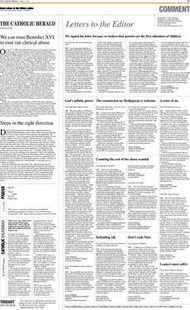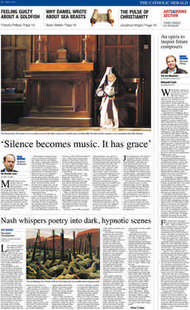Page 9, 9th April 2010
Page 9

Report an error
Noticed an error on this page?If you've noticed an error in this article please click here to report it.
Tags
Share
Related articles
Catholics Should Reject ‘evolutionary Propaganda’ Once...
No Escape
Criticism Confusing On Sex Declaration
Our Power Problem
When Is Spin A Serious Sin .
Change from above
Quentin de la Bédoyère Science and Faith
Ihave addressed in former columns the less fortunate aspects of the Church’s culture. In January I wrote of the dangers of power as an occasion of sin. In December last year I wrote of the poor state of communication in the community of the Church. And a number of incidental references have been made within other columns. So here I want to look at some aspects and difficulties which hinder changing the culture of an organisation. I am not an ecclesiast so I must draw on my experience of the management of large corporate organisations.
The biggest hurdle, which may throw the rider at the first fence, is recognising clearly the difference between how the organisation sees itself and how it actually is. The former is aspiration, the latter is gauged from behaviour. (We all have experience of this in our nightly examination of conscience.) Some simple examples may suffice. The organisation may present itself as open, consultative, and distinguished by its truthfulness. It may declare itself as constant in its values and principles of business since its foundation. It may lay claim to an authority of service rather than domination, allowing all decisions to be taken at the lowest practicable level. It may see itself as achieving a close-bonded community of mutual respect and concern – it may often use the term “family” to epitomise this.
Its behaviour may show whether this is a true description or a figment of management’s imagination. It will be sincere in its belief, and many or all of its lower ranks will collude. But a management consultant, who – having seen it all before – can spot the discrepancies, may have great difficulty in getting them accepted. I have heard many a management, viewing a consultant’s report, say: “Oh, but they don’t really understand our business”, when the problem is precisely that in this respect the consultant does. One reason for blindness to culture is, as it happens, Darwinian. That is, the members of the organisation soon recognise that they have to buy into the values if they wish to have a comfortable and successful career. If they are naturally adapted to this, they survive; if not, they are likely to leave. Over a period of time the membership becomes more and more homogeneous. This is reinforced because we have a neurological quirk which gives an arational error signal to our consciousness when we fail to conform to the values of our group. This is, of course, strengthened by the experience that we tend to be liked by those with whom we agree, and disliked by those from whom we dissent.
These phenomena become stronger and stronger as we move up the pecking order. After all, not only are the seniors likely to be more thoroughly impregnated with the culture but they have reached their senior positions by their ability to fit the culture. This is unfortunate because cultural change will almost always have to come from above.
It is here that the big issue enters. That issue, the first temptation laid before Adam and Eve by the Father of Lies, is love of power. Those who openly proclaim that they love power for its own sake are rare. Those who believe that they need power in order to do the good which only they can do are many. From failed senior politicians to hapless chief executives, faith in an ability to benefit their fellows only through their retention of power abounds. Obtaining and retaining power justifies lies, manipulation and the destruction of others. But this is not just at senior levels: turn your head through 360 degrees, and you will see love of power at every angle. Then look inside yourself, if you dare.
In fact, human beings need cultures if they are to live harmoniously in society; a propensity to conformity and a willing acceptance of authority has evolved so that human beings can flourish. But cultures are not ipso facto moral or immoral. They may be fundamentally flawed – such as Marxism, or fundamentally in line with humanity, such as democracy. But every culture has its strong points and its fault lines. And cultures continually change: usually this is gradual but, over a period, may be considerable. So every culture must always be open to examination, criticism and rectification. Robert Townsend, the management guru, had a frank friend whose job it was to call “hogwash” whenever appropriate. Every pope, indeed every bishop, should have a “hogwash” caller. Chief executives require a burr or two under their saddles.
Substantial change of culture is so hard to achieve that many corporations simply fail because they cannot adapt to need. That need may be a change in the market, technical innovation, legislation, growing inefficiency, creeping infidelity to mission and so on. While I have been speaking generally it is interesting to note the major cultural changes attempted at Vatican II, when the drafts produced by the Vatican Congregations (old culture) were thrown out by the bishops and replaced by a deeper grasp of the unchanging fundamentals. But the Congregations remained at the executive centre, while the bishops dispersed. And much of the old culture, established for two millennia, threatens to return.
We are now faced with a new crisis of culture. The occasion is the cover-up of clerical paedophilia, but that is only a symptom of a deeply indurated, indeed pre-medieval, culture of authority – at variance with the Gospel. Not only will it take generations to change, but it has not yet, as is so often the case, been recognised by the management, who – like Pope John in the 1960s – alone can initiate the long process of change.
blog comments powered by Disqus





















